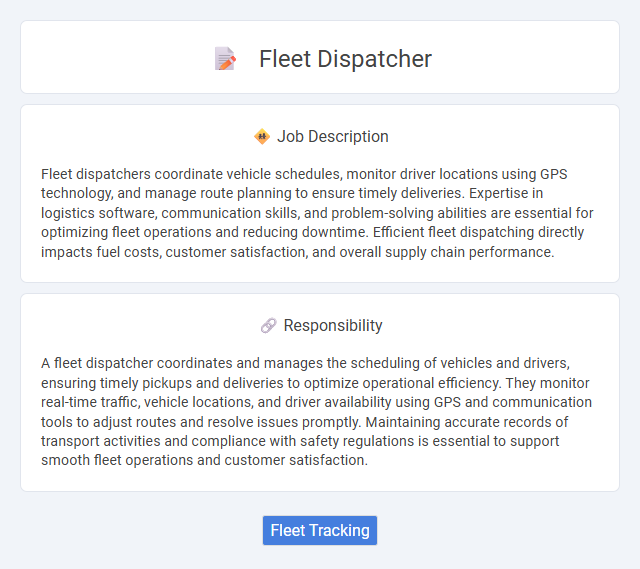
Fleet dispatchers coordinate vehicle schedules, monitor driver locations using GPS technology, and manage route planning to ensure timely deliveries. Expertise in logistics software, communication skills, and problem-solving abilities are essential for optimizing fleet operations and reducing downtime. Efficient fleet dispatching directly impacts fuel costs, customer satisfaction, and overall supply chain performance.
Individuals with strong organizational skills and the ability to remain calm under pressure are likely to be well-suited for a fleet dispatcher role. Those who thrive in fast-paced environments and possess effective communication capabilities may find this job aligns with their strengths. People who struggle with multitasking or handling high-stress situations might face challenges in adapting to this position.
Qualification
Fleet dispatcher roles require strong organizational skills, proficiency in logistics software, and excellent communication abilities to coordinate vehicle schedules and driver assignments efficiently. Candidates typically need experience in transportation management, a high school diploma or equivalent, and knowledge of local and federal transportation regulations. Certifications such as Certified Transportation Professional (CTP) enhance qualifications and demonstrate expertise in fleet coordination and compliance.
Responsibility
A fleet dispatcher coordinates and manages the scheduling of vehicles and drivers, ensuring timely pickups and deliveries to optimize operational efficiency. They monitor real-time traffic, vehicle locations, and driver availability using GPS and communication tools to adjust routes and resolve issues promptly. Maintaining accurate records of transport activities and compliance with safety regulations is essential to support smooth fleet operations and customer satisfaction.
Benefit
Fleet dispatcher jobs likely offer significant benefits such as competitive salaries and comprehensive health insurance packages. Employees may enjoy a stable work environment with opportunities for career advancement and skill development. The role probably includes benefits like paid time off and retirement plans, contributing to overall job satisfaction and financial security.
Challenge
Fleet dispatcher roles likely present significant challenges in managing real-time logistics and communication under tight deadlines. Coordinating multiple drivers and routes probably requires sharp problem-solving skills to adapt to unexpected delays and emergencies. Balancing efficiency and safety might often demand quick decision-making and stress resilience.
Career Advancement
A fleet dispatcher plays a crucial role in coordinating and managing vehicle routes to ensure efficient transportation operations. Expertise in logistics software, real-time route optimization, and compliance with transportation regulations enhances career advancement opportunities within this field. Progression paths often lead to roles such as logistics manager, operations supervisor, or supply chain analyst, driven by strong organizational skills and leadership experience.
Key Terms
Fleet Tracking
Fleet dispatchers are responsible for monitoring and managing vehicle locations using advanced fleet tracking systems that utilize GPS technology to provide real-time data. They optimize routes, improve fuel efficiency, and ensure timely deliveries by analyzing tracking metrics and vehicle status updates. Effective fleet tracking enhances operational efficiency and reduces downtime through proactive decision-making and resource allocation.
 kuljobs.com
kuljobs.com